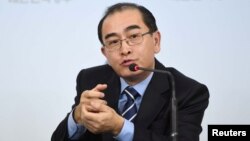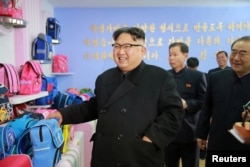A high-ranking North Korean defector says clashing with Pyongyang over its nuclear program has strengthened Kim Jong Un’s leadership, but continued human rights criticism and increased information from the outside world will over time lead to the downfall of the authoritarian and repressive regime.
Thae Yong-ho, North Korea’s former deputy ambassador in London, defected to South Korea in July, and has recently become an analyst with the Institute for National Security Strategy, a research organization affiliated with South Korea’s National Intelligence Service.
Thae has started speaking to media outlets in Seoul, providing insight into the mindset of the secretive Kim leadership, and how the international community can best foster change.
Nuclear standoff
The North Korean leader has openly declared his country a nuclear state despite U.N. Security Council resolutions banning the North’s nuclear and missile programs. In 2016 North Korea conducted two increasingly powerful nuclear tests and 24 missile tests from road mobile and submarine launch platforms.
The international community responded to these provocations with two rounds of increased international sanctions that impose new financial and trade restrictions on North Korea.
In his News Year’s message, Kim implied North Korea would soon test an intercontinental ballistic missile, which drew an immediate rebuke from U.S. President-elect Donald Trump, who tweeted, “It will not happen.”
Thae says the leadership in Pyongyang is unwilling to give up its nuclear program, and its defiance in the face of U.S.-led pressure has helped solidify internal popular support and earned the leadership a degree of international respect.
“Some countries are interested in following North Korea’s path to become nuclear powers themselves. Therefore, North Korean diplomats retain their dignity despite the criticisms of the international community,” Thae said.
Human rights
He says, however, international criticism about human rights abuses in North Korea undermines Kim’s standing in the world and with his own people.
In 2014 the United Nations General Assembly voted to refer North Korea to the International Criminal Court (ICC) for crimes against humanity after a Commission of Inquiry report documented ongoing atrocities in North Korea that include a network of political prisons in the country, as well as widespread and systematic abuses that include torture, enslavement, rape and murder.
The measure stalled in the U.N. Security Council where the North’s allies, China and Russia, would have likely vetoed the measure if brought to a vote.
Thae says North Korean diplomats have faced denunciations from allies and adversaries alike over Pyongyang’s human rights record, but the leadership is more concerned about how this kind of criticism could damage the carefully nurtured public image of Kim as a near-infallible leader.
“It is not easy for North Koreans to understand the concepts of the ICC or human rights. But they will be greatly interested if they hear that Kim Jong Un will be tried at the international court. It will be a direct sign that Kim Jong Un is a criminal and his regime has no future,” he said.
Information war
The greatest threat to the North Korean government, Thae says, is information from the outside world, not only critical news reports and oppositional political messages, but also movies and TV series that show how the outside world has developed.
“North Korea will collapse on its own when enough external information introduced through the internet reveals the truth of the Kim regime to the residents,” he said.
The advocacy group Human Rights Watch has criticized Kim for tightening controls on citizens through the country’s borders, increasing efforts to restrict expression and preventing outside information from entering the country.
Some analysts have said human rights criticisms only harden Pyongyang’s adversarial stance, and will make it more difficult to pursue diplomatic negotiations in the future to halt the North’s nuclear program.
But Thae’s views reinforce arguments made by human rights organizations that say promoting basic rights and freedom in North Korea is not an ancillary issue, but perhaps the best way to foster change from within.
VOA's Youmi Kim contributed to this report.






